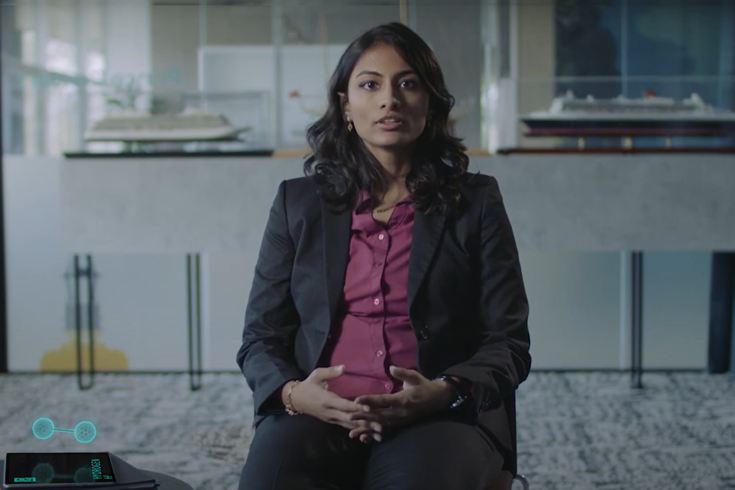It was Padmini Mellacheruvu’s experience in cryogenic systems, including liquid hydrogen and compressed hydrogen gas, gained at the Indian Space Research Organization (ISRO) that led to her appointment as Lead Technical Specialist in cryogenic and compressed fuel systems at Lloyd’s Register.
LR’s dedicated team of policy writers, including engineers and scientists, produced the first set of rules for the use of hydrogen as a fuel for ships in June last year (2023). These rules are now informing shipping’s decarbonisation efforts as the industry seeks to reach net-zero by 2050.
Sitting within this team, Mellacheruvu is not only writing the rules that will go on to support the safe and compliant use of hydrogen fuel on ships, she is also busy re-writing the rules on what are typically seen as male and female jobs.
Mellacheruvu joined LR over two years ago, prior to which she was an engineering scientist at the ISRO (Indian Space Research Organisation) where she was part of a team that tests and qualifies cryogenic propellant ground systems and liquid-propelled stages of the launch vehicle.
“Space research and engineering have been a passion of mine for as along as I can remember,” said Mellacheruvu. “Aerospace scientist and former Indian president A.P.J Abdul Kalam was a role model of mine as a girl and I read his books and followed his achievements. Working at the ISRO was always my greatest aspiration and it really was an amazing moment when I found out that I had been offered a position there.”
Graduating with a degree in mechanical engineering from one of India’s most selective universities, the Birla Institute of Technology and Science, Mellacheruvu acknowledged that despite forging a successful career in what are still predominantly male industries, she has never felt held back at any stage.
“I haven’t felt hemmed in by boundaries, because I haven’t seen them,” she said, explaining that when she joined ISRO she had to be firm that she didn’t want special treatment. She had to reassure her managers that she was happy to do the onsite work, which could be at height, in enclosed spaces and involve climbing and would often take place outside of regular 9-5 working hours.
“There was a lot of lenience from well-meaning colleagues towards me because I was one of the very few women working there in a field-based job,” she explained. “But it was more about the new newness of having a woman around that made them go the extra mile to offer support. But I didn't feel I needed it and used the opportunity to prove myself and work in the usual way alongside the rest of the team,” she said, adding that ISRO ensured that there were suitable toilet facilities at the site and that safe transport was put in place when travelling to the remotely located rocket launch station.
“A lot of the work was already completed for other women before I got there,” she pointed out, adding that there have been women working at the ISRO’s rocket launch station since it opened in the late 1960s. “This is the way forward. The more women that go into these roles, the more it will be accepted and the more normal it will become.”
Mellacheruvu’s position at LR involved her relocation to the UK and she comments that there is a lot of diversity across the business. “As a woman of colour, and with English my second language, I have never felt excluded. There are several people like me in the business and as you would expect from a multi-national corporation every need is fulfilled.”
Whilst she has always had a passion for engineering, she realises that not everyone has such a defined vision of what they want from a career. Her advice is to keep an open mind and at least consider the good opportunities for women across the space, maritime and engineering sectors and encourages young women to consider STEM (science, technology, engineering and mathematics) subjects at school. To look again at whether these are subjects they could be interested in, “rather than something that’s not fun.
“If you're passionate about it, whatever age you are, I would encourage you to stop listening to others who give feedback that it's probably not for you.”
Her advice to all women in profession roles is to bring your “own brand of independence and individualism” and eventually you will be accepted.
“We need to be strong, not take it to heart and be persistent and project own personalities in a respectful manner. And I think that's more than enough to get acceptance from anyone in any walk of life.”
In the video below, Padmini provides an overview of hydrogen as a fuel for shipping including the technical challenges, safety elements and energy density.







